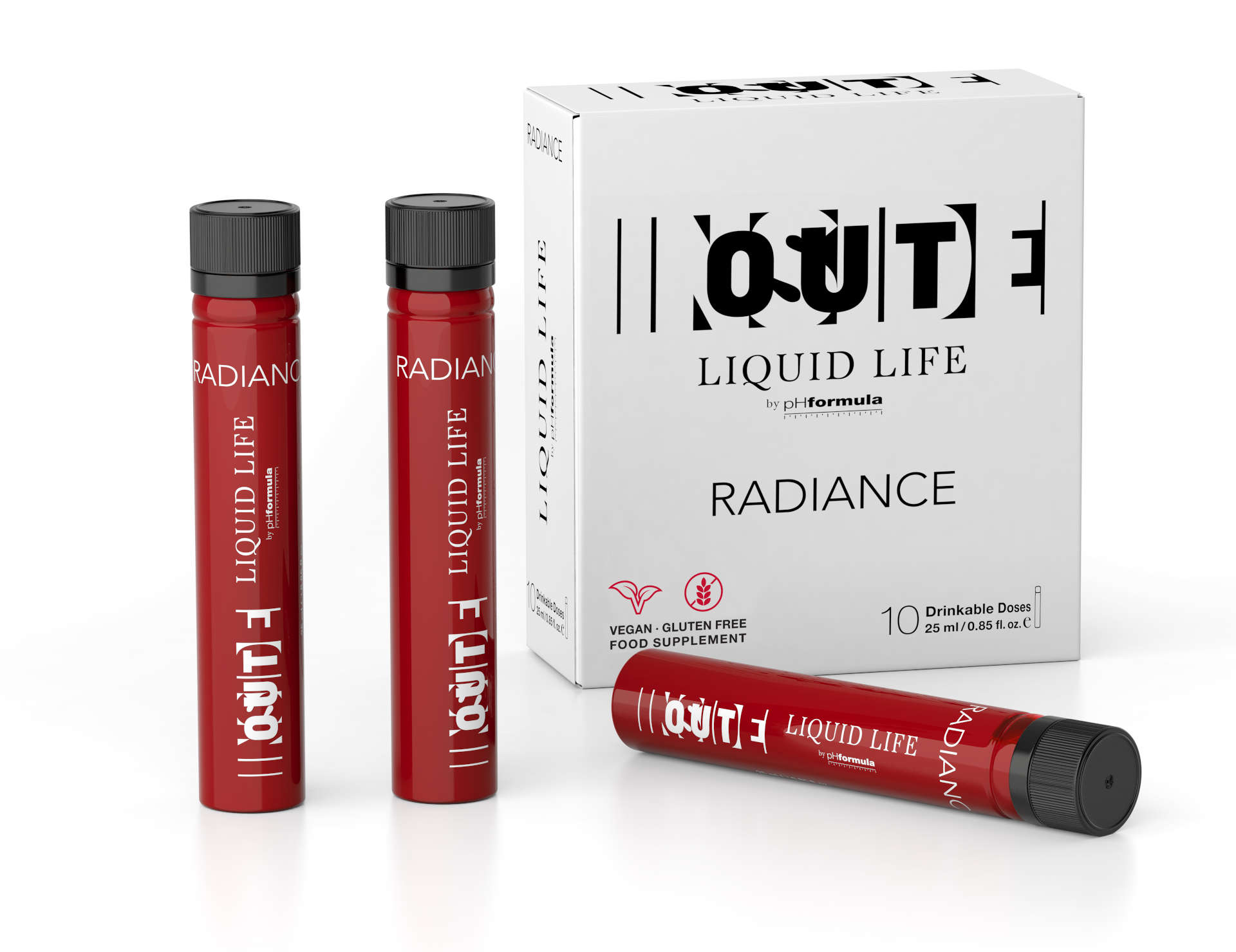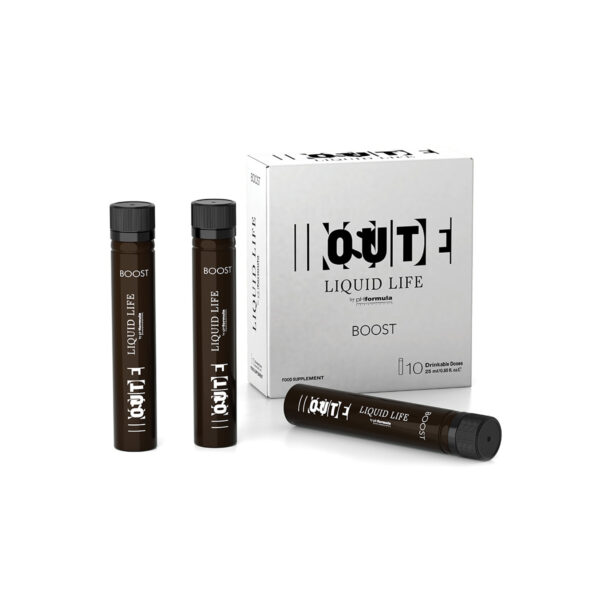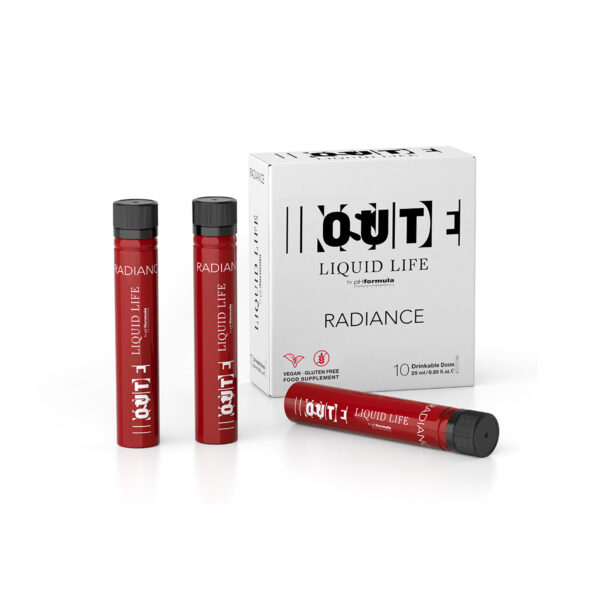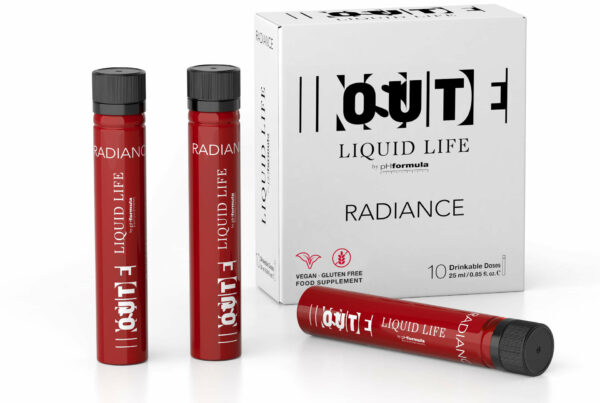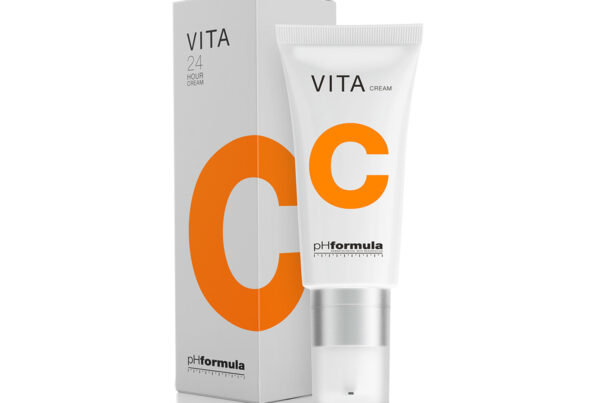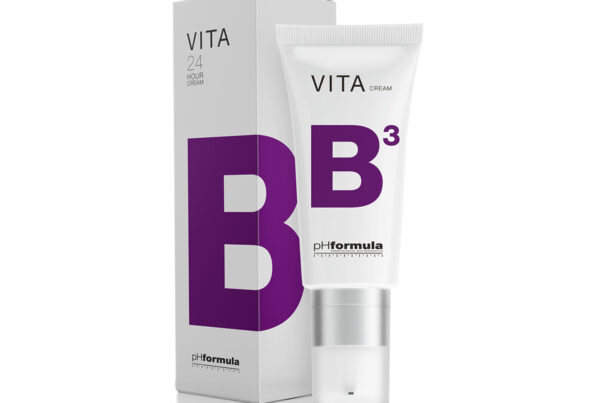Although there are some controversies and debates surrounding the benefits of supplements on skin health, many studies and anecdotal evidence suggest that certain vitamins, when taken orally, can have positive effects on skin health – but there are several factors and considerations to keep in mind. While skin supplements can contribute to skin health, their effectiveness and suitability can vary among individuals and skin conditions. It’s essential to consult with a professional to determine the most appropriate approach to address specific skin concerns and incorporate oral vitamins into a comprehensive skincare regimen when appropriate.
Additionally, a balanced diet rich in nutrients is a fundamental aspect of maintaining healthy skin. But, how can we ensure our diet is hitting these important milestones? This is where Liquid Life comes in. pHformula’s Liquid Life supplement has been specifically formulated with ingredients that have been optimised for ingestion and absorption by the body.
Two variations of the Liquid Life are available, Radiance and Boost, making it easy to introduce a whole plethora of bio-supporting ingredients into your diet to support your body from the inside-out.
Pyrenees Thermal Spring Water: Ingesting Pyrenees Thermal Spring Water can be beneficial for skin health. This naturally sourced water is infused with a variety of essential minerals, including calcium, magnesium, and potassium. When consumed, these minerals can promote skin hydration and overall skin health from the inside out. Calcium plays a crucial role in maintaining the skin’s barrier function, which is essential for protecting against environmental pollutants and retaining moisture. The magnesium in thermal spring water can help soothe skin irritation and inflammation, making it beneficial for those with sensitive skin. Regular intake of this mineral-rich water can contribute to a more balanced, radiant complexion by addressing issues like dryness and redness.
In addition to minerals, the unique composition of Pyrenees Thermal Spring Water often includes trace elements that support the skin’s natural processes. For instance, selenium, commonly found in thermal spring waters, acts as a potent antioxidant, helping to protect the skin from oxidative stress and premature ageing. When incorporated into a balanced diet, Pyrenees Thermal Spring Water’s mineral content and trace elements can work synergistically to maintain skin’s moisture levels, promote a healthy complexion, and reduce skin discomfort.
Collagen Peptides: Collagen Peptides, when ingested, offer notable benefits for skin health. Collagen is a critical protein that provides structural support to the skin, helping it stay firm, elastic, and youthful-looking. As the body ages, collagen production naturally decreases, resulting in the development of wrinkles and loss of skin elasticity. Ingesting collagen peptides as a supplement can help replenish the body’s collagen levels, potentially leading to improved skin elasticity and hydration. Numerous studies have suggested that collagen supplements may reduce the appearance of fine lines and wrinkles, contributing to a smoother and more youthful complexion. Additionally, collagen peptides can support the skin’s ability to heal and regenerate, making them a favoured choice for individuals seeking to maintain healthy, vibrant skin.
Collagen is also a source of specific amino acids like proline and glycine, which are essential for skin health. These amino acids play key roles in collagen synthesis and skin tissue repair. When taken as a dietary supplement, collagen peptides can enhance the body’s ability to repair and rejuvenate the skin, potentially leading to a more youthful and radiant appearance. Integrating collagen peptides into your daily routine, in combination with a well-balanced diet, can help support skin’s natural functions and maintain its overall health.
Aloe Vera Extract: Ingesting Aloe Vera Extract can have several positive effects on skin health. Aloe vera is well-known for its soothing and healing properties when applied topically, but when consumed as a supplement, it can also benefit the skin from within. Aloe vera contains a variety of bioactive compounds, including vitamins, minerals, enzymes, and amino acids. These compounds work together to support overall skin health. For instance, vitamin C in aloe vera can promote collagen production, enhancing skin elasticity and reducing the appearance of fine lines. Additionally, aloe vera’s natural anti-inflammatory properties can help alleviate skin irritation and redness.
One of the key benefits of ingesting aloe vera is its potential to support gut health. A healthy gut microbiome is closely linked to skin health, as imbalances in gut bacteria can lead to skin issues. Aloe vera can help soothe and balance the digestive system, which, in turn, may lead to clearer, healthier skin. Moreover, aloe vera’s detoxifying properties may aid in the removal of toxins from the body, further benefiting skin health. By incorporating aloe vera into your diet, you can nourish your skin from the inside out, potentially achieving a smoother, more radiant complexion.
Hyaluronic Acid: Ingesting Hyaluronic Acid can be advantageous for skin health, particularly in maintaining hydration and combating signs of aging. Hyaluronic acid is a naturally occurring molecule in the body, known for its ability to retain moisture. When ingested as a supplement, hyaluronic acid can promote skin hydration from within, improving skin texture and suppleness. This enhanced hydration can help reduce the appearance of fine lines and wrinkles, giving the skin a more youthful and refreshed look.
Furthermore, hyaluronic acid is involved in tissue repair and regeneration. When taken orally, it may support the body’s ability to heal and rejuvenate the skin. Hyaluronic acid supplements can also aid in promoting skin elasticity, which is essential for maintaining a firm and youthful complexion. While hyaluronic acid is primarily recognised for its topical applications, its oral supplementation can complement your skincare routine, providing a holistic approach to achieving and maintaining healthy, well-hydrated skin. Incorporating hyaluronic acid into your daily regimen, alongside a balanced diet, can help enhance your skin’s moisture retention and overall appearance.
Vitamin C: Ingesting Vitamin C offers numerous benefits for skin health. Vitamin C, also known as ascorbic acid, is a potent antioxidant that plays a crucial role in maintaining the health and appearance of the skin. When consumed as part of a balanced diet or in supplement form, Vitamin C can provide significant support for skin rejuvenation. This essential vitamin is integral to collagen synthesis, a process vital for skin elasticity and firmness. By promoting collagen production, Vitamin C can help reduce the appearance of fine lines and wrinkles, contributing to a more youthful complexion.
Vitamin C also acts as a shield against skin-damaging free radicals generated by sun exposure and environmental pollutants. It helps to neutralise these harmful compounds, protecting the skin from oxidative stress and premature aging. Moreover, Vitamin C is well-known for its skin-brightening properties, reducing the appearance of dark spots and uneven skin tone. Ingesting adequate amounts of Vitamin C supports an even, radiant complexion by inhibiting melanin production. Incorporating Vitamin C-rich foods or supplements into your diet can enhance your skin’s overall health and appearance, leaving it looking rejuvenated, youthful, and protected.
Zinc (Zn): Ingesting Zinc (Zn) is essential for maintaining healthy skin. This mineral plays several critical roles in supporting skin functions and overall well-being. Zinc is known for its contribution to the skin’s immune response, which helps combat bacteria and infections. When ingested through a balanced diet or supplements, Zinc can support the body’s natural defences against skin conditions like acne, as it helps regulate oil production and reduce inflammation.
Furthermore, Zinc plays a role in the synthesis of collagen, a crucial protein that provides structural support to the skin. Adequate Zinc intake can enhance collagen production, promoting skin elasticity and reducing the appearance of fine lines and wrinkles. This mineral is also an antioxidant, helping to protect the skin from oxidative damage caused by UV rays and environmental factors. Zinc supplements or dietary sources of Zinc can be beneficial for those looking to maintain clear, healthy, and youthful skin. Ensuring sufficient Zinc levels in your diet can lead to a more resilient complexion and may help alleviate various skin concerns.
Astaxanthin: Astaxanthin is a powerful antioxidant carotenoid known for its skin-protective properties. When ingested, it helps combat oxidative stress caused by UV radiation and environmental pollutants, which can lead to premature aging and skin damage. Astaxanthin has been shown to improve skin elasticity, moisture retention, and overall skin texture. Additionally, it may reduce the appearance of fine lines and wrinkles, making it a valuable supplement for those seeking to maintain youthful and radiant skin.
Beta-Carotene: Beta-carotene, a precursor to Vitamin A, plays a significant role in skin health. When consumed, beta-carotene is converted into Vitamin A, which is essential for maintaining healthy skin and mucous membranes. It promotes skin cell turnover, helping to reveal fresh, new skin cells and reduce the appearance of dullness. Beta-carotene also acts as a natural sun protectant, providing an added layer of defense against UV radiation. Regular intake of beta-carotene-rich foods or supplements can contribute to a smoother complexion, improved skin tone, and a reduced risk of skin conditions related to Vitamin A deficiency.
These ingredients, when included in a balanced diet or taken as supplements, can offer valuable support for skin health, providing protection against environmental damage, promoting a youthful appearance, and contributing to overall skin vitality.
Choline: Choline is a vital nutrient that plays a multifaceted role in supporting skin health when consumed. It serves as a precursor to phosphatidylcholine, a component of cell membranes, contributing to their integrity and stability. Adequate choline intake helps maintain the structural integrity of skin cells, ensuring they function optimally. Choline also supports the production of lipoproteins, essential for transporting fats and cholesterol in the body. This function indirectly benefits the skin by helping regulate sebum production, which can reduce the likelihood of clogged pores and acne breakouts. Additionally, choline is involved in nerve signalling, contributing to the sensation and perception of the skin. Including choline-rich foods in your diet or taking choline supplements can aid in maintaining skin cell health, reducing the risk of skin conditions, and supporting a balanced complexion.
Vitamin E: Vitamin E is a potent antioxidant that offers a range of benefits for skin health when ingested. This vitamin helps protect the skin from the damaging effects of free radicals generated by exposure to UV radiation and environmental pollutants. By neutralising these harmful compounds, Vitamin E helps prevent premature aging and reduces the risk of skin conditions associated with oxidative stress. Vitamin E also supports skin hydration and moisture retention, making it particularly beneficial for those with dry or dehydrated skin. Moreover, it plays a role in promoting overall skin elasticity by supporting collagen production, contributing to a firmer and more youthful appearance. Ensuring sufficient Vitamin E intake through dietary sources or supplements can significantly contribute to maintaining radiant, healthy, and well-protected skin.

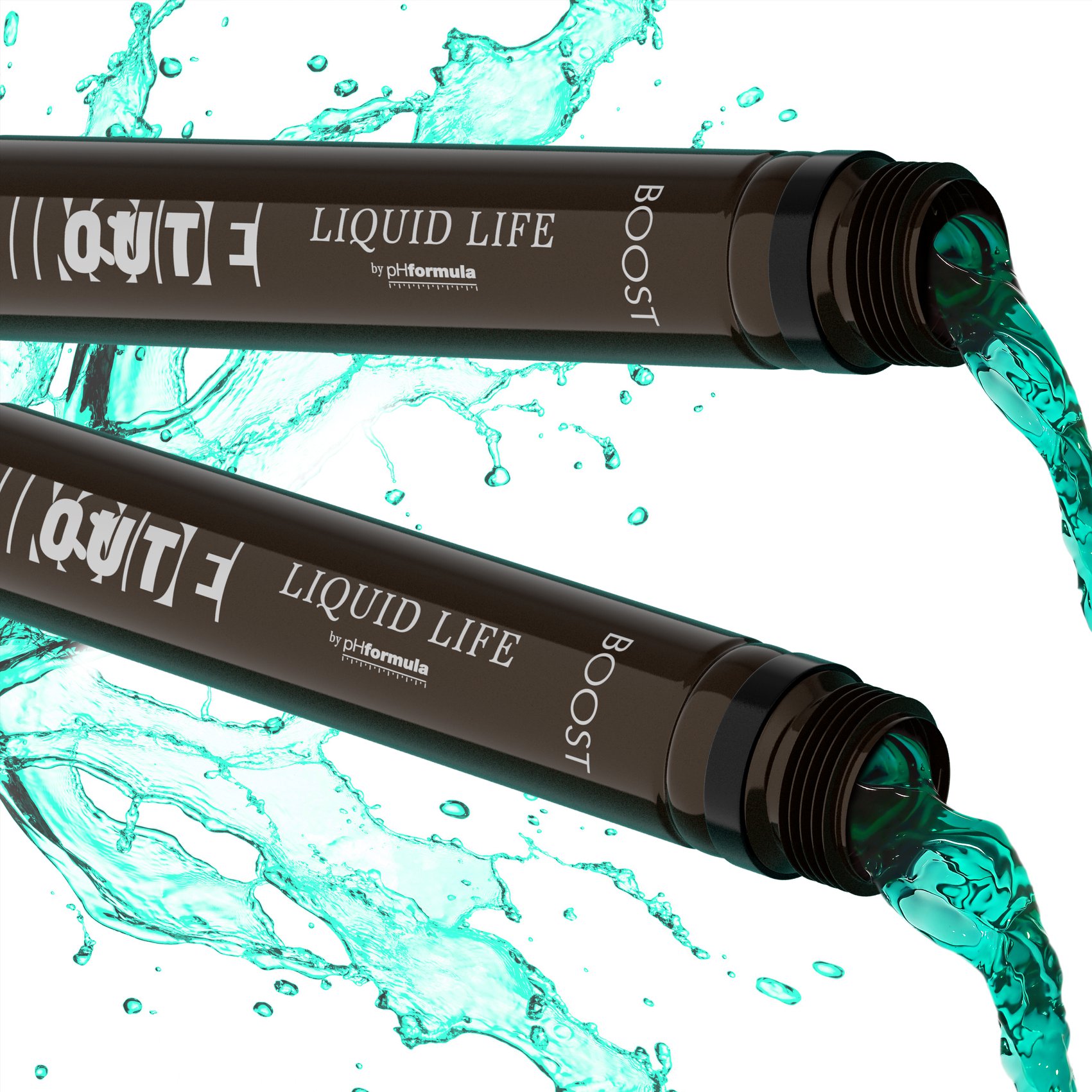
Vitamin B1 (Thiamine): Ingesting Vitamin B1, also known as thiamine, plays a crucial role in supporting skin health. Thiamine is involved in energy metabolism and helps the body convert food into energy. This energy is essential for maintaining skin cell turnover, repair, and regeneration. Thiamine also supports the proper functioning of nerve cells, which are responsible for transmitting signals related to skin sensations and healing. A deficiency in Vitamin B1 can result in various skin issues, including dryness, sensitivity, and a compromised ability to heal wounds. By incorporating foods rich in thiamine, such as whole grains, nuts, and legumes, or taking thiamine supplements, you can support healthy skin functioning, leading to improved skin texture and overall vitality.
Vitamin B3 (Niacin): Ingesting Vitamin B3, or niacin, offers significant benefits for skin health. Niacin plays a vital role in maintaining the skin’s barrier function, which is essential for protecting against environmental pollutants and retaining moisture. It helps regulate oil production and can be particularly beneficial for those with oily or acne-prone skin, as it may reduce the severity of breakouts and promote clearer skin. Moreover, niacin boosts the production of ceramides, lipids that help maintain the skin’s moisture content and overall hydration. By supporting the skin’s barrier and moisture-retention capabilities, niacin contributes to a smoother, more radiant complexion. Ingesting niacin-rich foods, such as lean meats, fish, and whole grains, or taking niacin supplements, can help enhance the overall health and appearance of your skin.
Vitamin B5 (Pantothenic Acid): Ingesting Vitamin B5, also known as pantothenic acid, is essential for maintaining healthy skin. Pantothenic acid is involved in various metabolic processes, including the synthesis of fatty acids and lipids. These compounds are integral to the skin’s barrier function, which protects against moisture loss and environmental stressors. By supporting the skin’s lipid barrier, pantothenic acid helps maintain hydration levels, resulting in a smoother and more supple complexion. Furthermore, this B vitamin is involved in collagen production, contributing to skin elasticity and reduced fine lines. Adequate Vitamin B5 intake, either through a balanced diet or supplements, can promote overall skin health and assist in achieving a youthful, hydrated appearance.
Vitamin B6 (Pyridoxine): Ingesting Vitamin B6, also known as pyridoxine, plays a significant role in maintaining healthy skin. This B vitamin is involved in various metabolic processes, including the synthesis of amino acids, which are the building blocks of proteins. Proteins are crucial for skin health, as they contribute to the structure and firmness of the skin. Vitamin B6 also plays a role in regulating hormonal balance, and hormonal imbalances can sometimes lead to skin issues such as acne. By contributing to hormonal equilibrium, Vitamin B6 may help reduce the severity of hormonal skin problems.
Additionally, Vitamin B6 assists in the production of neurotransmitters like serotonin and dopamine, which can affect mood and stress levels. High stress levels can exacerbate skin conditions, so maintaining healthy stress responses through proper Vitamin B6 intake can indirectly contribute to clearer, healthier skin. Including Vitamin B6-rich foods in your diet, such as poultry, fish, and bananas, or taking Vitamin B6 supplements, can support overall skin health, promote a more balanced complexion, and potentially alleviate certain skin concerns.
Vitamin B12 (Cobalamin): Ingesting Vitamin B12, also known as cobalamin, is essential for maintaining vibrant skin. This B vitamin is involved in DNA synthesis and cellular metabolism, contributing to the renewal and regeneration of skin cells. Adequate Vitamin B12 levels promote skin cell turnover, leading to a fresher and more youthful complexion. Additionally, Vitamin B12 helps in the formation of red blood cells, which carry oxygen and nutrients to skin cells. Proper oxygenation is crucial for healthy skin, as it supports skin repair and overall vitality.
Vitamin B12 is also known for its role in preventing skin conditions associated with anaemia, a condition characterised by insufficient red blood cells. Anaemia can lead to pale, sallow skin and dark under-eye circles. Ensuring sufficient Vitamin B12 intake, either through dietary sources like animal products or B12 supplements, can help prevent anaemia-related skin issues and promote a healthy, radiant complexion. By supporting skin cell renewal, oxygenation, and overall skin health, Vitamin B12 contributes to a vibrant and revitalised appearance.
Biotin: Ingesting Biotin, also known as Vitamin H, offers various benefits for skin health. Biotin is a water-soluble B vitamin that plays a significant role in maintaining the health of the skin, hair, and nails. It supports the production of keratin, a protein that forms the structural basis of these tissues. Adequate biotin intake helps promote healthy, strong nails and can reduce the likelihood of brittle or split nails. Moreover, biotin supports skin health by contributing to its overall hydration. It helps maintain the skin’s moisture barrier, which is essential for preventing dryness and irritation. Biotin can also aid in the management of skin conditions such as acne, as it plays a role in fatty acid synthesis and metabolic processes that influence skin health. Including biotin-rich foods in your diet or taking biotin supplements can contribute to the overall health and appearance of your skin, hair, and nails.
Vitamin K2: Ingesting Vitamin K2 provides unique benefits for skin health, particularly in promoting a clear and even complexion. Vitamin K2 plays a vital role in regulating blood clotting and preventing excessive bruising. When ingested as part of a balanced diet or supplements, Vitamin K2 can help reduce the appearance of dark circles under the eyes, which are often caused by small blood vessels leaking into the skin. This vitamin’s ability to improve blood circulation can enhance the overall health and appearance of the skin. Additionally, Vitamin K2 supports the skin’s ability to heal wounds and injuries effectively, contributing to faster recovery and reduced scarring. While Vitamin K2 primarily addresses skin concerns related to circulation and wound healing, its regular intake can lead to a clearer and more radiant complexion.
Selenium (Se): Ingesting Selenium offers several skin-related benefits due to its potent antioxidant properties. Selenium is a trace mineral that helps protect the skin from oxidative damage caused by free radicals. This protection is crucial for maintaining youthful, healthy skin, as oxidative stress is a major contributor to premature aging and skin conditions. Selenium works alongside other antioxidants in the body, such as Vitamin E, to neutralize harmful free radicals. Regular consumption of Selenium-rich foods, like nuts, seeds, and seafood, or taking Selenium supplements can enhance the skin’s ability to combat environmental pollutants and UV radiation, ultimately leading to a more youthful and resilient complexion. Additionally, Selenium contributes to a well-functioning immune system, indirectly benefiting the skin by helping to manage skin conditions related to immune dysfunction. By protecting the skin from oxidative stress and supporting overall skin health, Selenium is a valuable nutrient for maintaining a radiant and youthful appearance.
Folate: Folate, also known as Vitamin B9, plays a crucial role in supporting skin health when ingested. This water-soluble B vitamin is involved in DNA synthesis and repair, a process vital for the growth and renewal of skin cells. Adequate folate intake ensures that the skin can effectively replace damaged or aging cells, leading to a smoother and more youthful complexion. Additionally, folate contributes to the production of red blood cells, which transport oxygen and nutrients to the skin cells. Proper oxygenation is essential for maintaining healthy skin, supporting its overall vitality and glow. While folate deficiency can result in skin issues like dryness and sensitivity, incorporating folate-rich foods into your diet or taking folate supplements can promote optimal skin cell turnover and help maintain a vibrant complexion.
Lutein: Lutein, a carotenoid and antioxidant, offers several skin benefits when ingested as part of a balanced diet. This compound is well-known for its role in promoting eye health, but it also plays a protective role in the skin. Lutein helps shield the skin from the damaging effects of UV radiation and high-energy visible (HEV) light, often referred to as “blue light,” which can contribute to premature aging and skin damage. By neutralising free radicals generated by UV and blue light exposure, lutein helps reduce the risk of photoaging, fine lines, and wrinkles. Furthermore, lutein contributes to maintaining the skin’s moisture balance, promoting hydration and preventing dryness. Incorporating lutein-rich foods such as leafy greens, egg yolks, and corn into your diet can provide an additional layer of protection for your skin against environmental stressors, ensuring a more youthful and resilient complexion.
Lycopene: Lycopene is a potent antioxidant found in red and pink fruits and vegetables like tomatoes, watermelon, and grapefruit. When ingested, lycopene contributes to skin health by providing robust protection against UV radiation and free radicals. UV radiation is a primary contributor to skin aging and damage, leading to wrinkles, fine lines, and hyperpigmentation. Lycopene’s ability to neutralise free radicals helps reduce the risk of these effects, promoting a more youthful complexion. Additionally, lycopene has been shown to have anti-inflammatory properties, making it beneficial for individuals with inflammatory skin conditions such as acne or rosacea. Incorporating lycopene-rich foods into your diet or taking lycopene supplements can fortify your skin’s defences against environmental stressors and contribute to a smoother, healthier appearance.
Silicium (Silicon): Silicium, also known as silicon, is a trace mineral that plays a vital role in skin health when ingested. It contributes to the synthesis of collagen and elastin, essential proteins that maintain the skin’s elasticity and firmness. As we age, collagen and elastin production naturally decreases, leading to sagging skin and the formation of wrinkles. Silicium supplements or dietary sources of silicon, such as whole grains and certain vegetables, can help support collagen and elastin production, promoting a more youthful and supple complexion. Silicium also aids in maintaining the skin’s hydration by supporting the synthesis of hyaluronic acid, a molecule known for its water-retaining properties. By optimising collagen production and hydration levels, silicium contributes to smoother, plumper, and healthier-looking skin, making it a valuable nutrient for those seeking skin rejuvenation and anti-aging benefits.
Zeaxanthin: Zeaxanthin is a carotenoid pigment found in various foods, particularly in dark green leafy vegetables and colourful fruits like spinach, kale, and kiwi. While it is well-known for its role in eye health, zeaxanthin also offers skin benefits when ingested. This antioxidant carotenoid serves as a natural protector for the skin against oxidative stress caused by UV radiation and environmental pollutants. By neutralising free radicals and minimising the harmful effects of UV exposure, zeaxanthin helps prevent premature ageing, such as the formation of fine lines, wrinkles, and age spots. Moreover, zeaxanthin contributes to skin hydration and moisture retention, promoting a supple and healthy complexion. Incorporating zeaxanthin-rich foods into your diet can enhance your skin’s defence mechanisms, resulting in a more youthful and radiant appearance. Additionally, the protective effects of zeaxanthin extend beyond the skin, making it a valuable nutrient for overall health and well-being.

